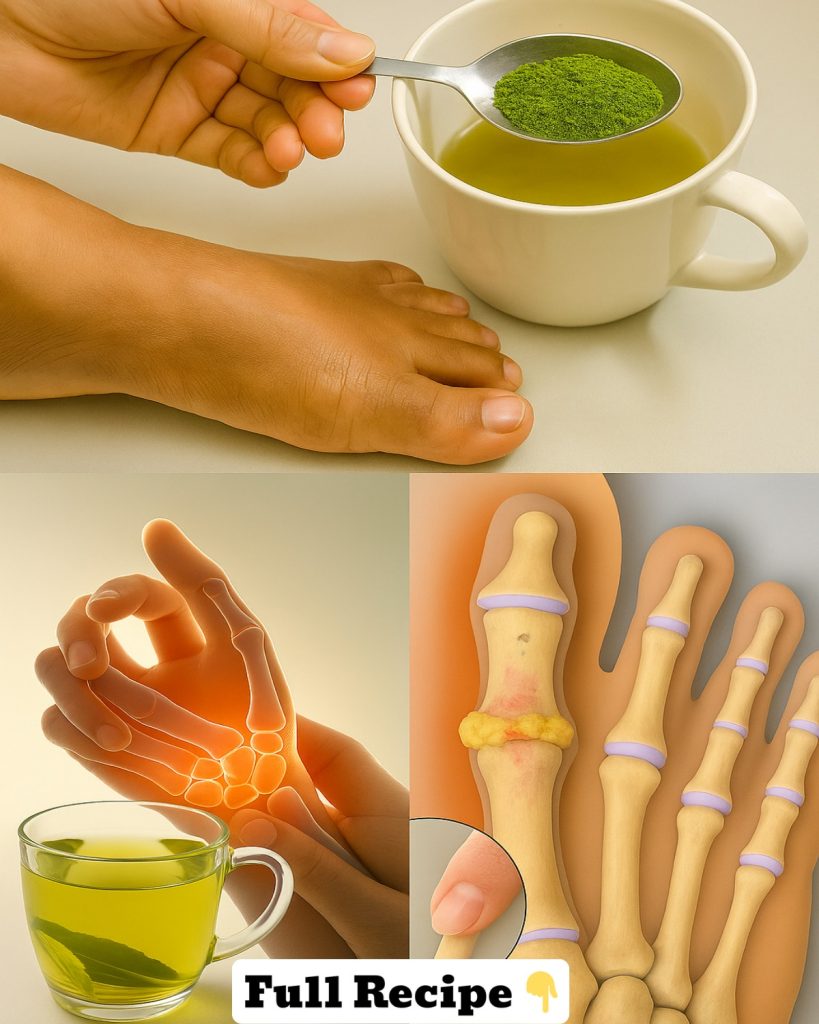The Herbal Tea That May Help Reduce Swollen Legs and Ankles
If you’ve ever noticed your shoes feeling tight after a long day, or looked down to see your ankles puffy and heavy, you’re not alone. Swelling in the lower legs, ankles, and feet—also called edema—is incredibly common. According to the National Institutes of Health, millions of adults experience some form of leg swelling each year, particularly seniors, those who sit or stand for long periods, and individuals with circulation concerns.
While mild swelling may be temporary, it can be uncomfortable and, in some cases, a warning sign of underlying health issues. For centuries, people have turned to natural remedies to help ease the heaviness and restore balance. One of the simplest and most effective approaches? Herbal teas. Certain herbs have been traditionally used to support circulation, reduce fluid retention, and soothe inflammation.
This article explores the best herbal teas for swollen legs and ankles, how they may help, simple recipes you can try at home, and lifestyle strategies to combine with tea for better results.
How Herbal Teas May Help With Swelling
Herbal teas are more than just warm, comforting drinks—they’re functional remedies. Many herbs contain natural compounds that support the body’s circulation and fluid balance. Here’s how they may work:
- Mild diuretic effect: Some herbs encourage the body to release excess fluid through urine.
- Anti-inflammatory support: Certain teas help reduce swelling in tissues.
- Circulation boost: Warming herbs can stimulate blood flow, preventing fluid from pooling.
- Relaxation: Stress and poor sleep can worsen swelling; herbal teas calm the body and mind.
These benefits are subtle but can add up when enjoyed consistently.
6 Herbal Teas for Swollen Legs and Ankles
1. Dandelion Tea
Dandelion has long been used as a natural diuretic.
- Why it helps: Encourages the release of excess water while providing potassium to balance electrolytes.
- How to enjoy: Steep 1 teaspoon dried dandelion root or leaves in hot water for 10 minutes. Drink once daily.
2. Ginger Tea
Ginger is both stimulating and soothing.
- Why it helps: Improves circulation and reduces inflammation thanks to compounds like gingerol.
- How to enjoy: Simmer fresh ginger slices in water for 10 minutes. Add lemon for extra detox support.
3. Parsley Tea
This kitchen staple is also a powerful herbal remedy.
- Why it helps: Acts as a mild diuretic and helps the body flush excess sodium, which contributes to swelling.
- How to enjoy: Steep 1 teaspoon dried parsley (or a handful of fresh leaves) in hot water for 5 minutes.
4. Chamomile Tea
Best known for relaxation, chamomile also aids swelling indirectly.
- Why it helps: Reduces stress-related inflammation and supports better sleep, giving the body time to heal.
- How to enjoy: Steep chamomile flowers or a tea bag for 5–7 minutes before bedtime.
5. Green Tea
Green tea is packed with antioxidants.
- Why it helps: Contains catechins that support blood vessel health and provide a gentle diuretic effect.
- How to enjoy: Brew 1 teaspoon green tea leaves or 1 tea bag for 2–3 minutes. Avoid drinking late at night due to caffeine.
6. Hibiscus Tea
Vibrant and tangy, hibiscus is both refreshing and therapeutic.
- Why it helps: Supports kidney function, reduces fluid retention, and delivers vitamin C and antioxidants.
- How to enjoy: Steep dried hibiscus petals in hot water for 10 minutes. Also delicious served iced.
How to Make Herbal Tea for Swelling
Simple Recipe (1 Serving):
- 1 teaspoon dried herb (or 1 tea bag)
- 1 cup hot water (just below boiling)
- Steep 5–10 minutes depending on the herb
- Strain and sip warm, or cool with ice
Tips for Best Results:
- Drink 1–2 cups daily, not in excess.
- Combine herbs for added benefits (ginger + hibiscus, parsley + mint).
- Use fresh herbs when possible or buy high-quality dried teas.
Lifestyle Tips to Reduce Swelling Naturally
Herbal teas work best when combined with other supportive habits. Consider these strategies:
- Elevate your legs: Raise them above heart level for 20 minutes.
- Stay active: Gentle walking, stretching, or ankle rotations keep circulation moving.
- Lower salt intake: Too much sodium is a leading cause of water retention.
- Wear compression socks: Help prevent fluid buildup if swelling is frequent.
- Stay hydrated: Ironically, drinking more water reduces swelling by flushing excess sodium.
Quick Reference Table
| Herbal Tea | Main Benefit | Best Time to Drink |
|---|---|---|
| Dandelion | Diuretic, fluid release | Morning or afternoon |
| Ginger | Circulation, anti-inflammatory | Morning |
| Parsley | Flushes sodium, mild diuretic | Afternoon |
| Chamomile | Relaxation, reduces stress swelling | Evening |
| Green Tea | Antioxidants, mild diuretic | Morning or early afternoon |
| Hibiscus | Vitamin C, fluid regulation | Anytime, hot or iced |
Conclusion
Q: Can I drink these teas every day?
Yes, 1–2 cups per day is safe for most people. Moderation is key.
Q: How soon will I notice results?
Some people feel lighter within a few days; for others it may take several weeks.
Q: Are these teas safe for everyone?
Not always. Pregnant women, people with kidney issues, or those on medications should check with their doctor first.
Q: Which tea is best for quick relief?
Dandelion and parsley are often chosen for their natural diuretic effects.
Q: Can I mix different teas together?
Yes. Blending herbs such as ginger with hibiscus or parsley with mint enhances both flavor and benefits.
Important Note: This article is for informational purposes only and not a substitute for medical advice. If swelling is severe, persistent, or painful, consult your healthcare provider to rule out underlying conditions.



